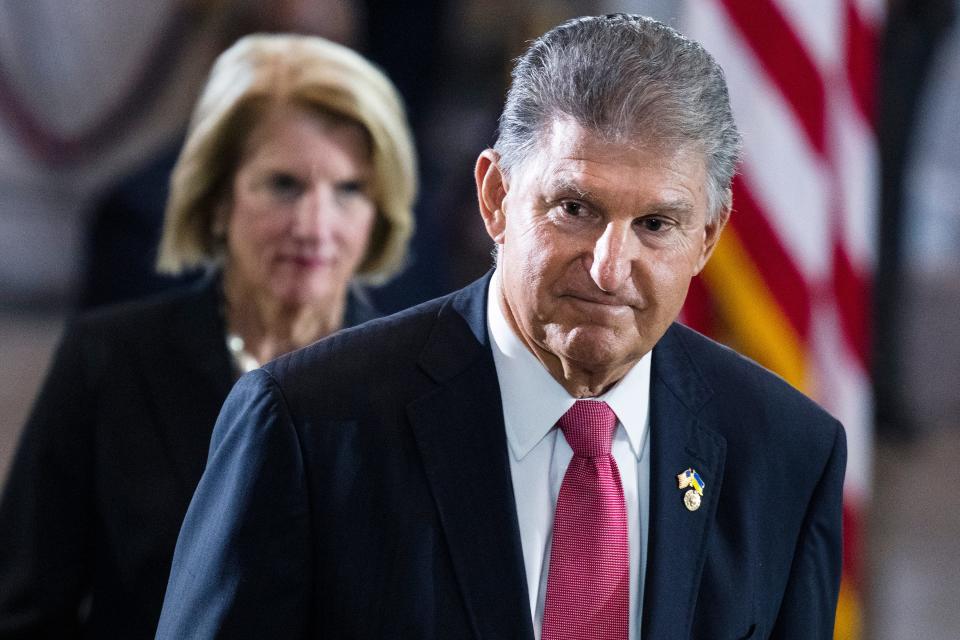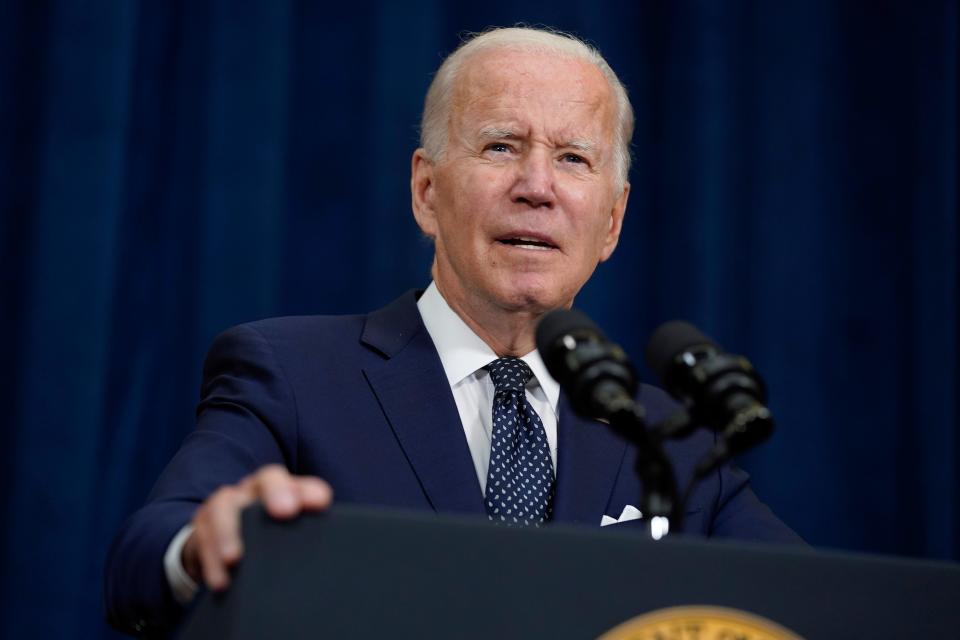Biden promises 'strong executive action' on climate change after Sen. Manchin dooms domestic agenda
WASHINGTON – President Joe Biden vowed Friday to take "strong executive action" to address climate change after Sen. Joe Manchin, D-W.Va., doomed the president's efforts to revive major pieces of his domestic legislative agenda.
Declaring he "won't back down," the president said he would use executive authority after Manchin on Thursday rejected proposals to combat climate change and raise taxes on the wealthy in negotiations for a spending package with Senate Majority Leader Chuck Schumer, D-N.Y.
What Biden is saying:
"Action on climate change and clean energy remains more urgent than ever," Biden said in a written statement while he is traveling in the Middle East. "So let me be clear: if the Senate will not move to tackle the climate crisis and strengthen our domestic clean energy industry, I will take strong executive action to meet this moment."
Biden did not specify the potential executive actions, but he said they would seek to create jobs, improve U.S. energy security, bolster manufacturing and supply chains, and address climate change. Whether any executive actions from Biden on climate have the same teeth as the legislation remains to be seen.
Biden also called on the Senate to pass legislation before the August recess aimed at lowering prescription drug prices and extending subsidies for the Affordable Care Act – the two areas where Manchin and other Democrats have found agreement.
More: Sen. Joe Manchin cools on spending negotiations, citing fears of an 'inflation fire'
How we got here:
Manchin, a moderate Democrat key to a deal, told Schumer in a meeting Thursday that "he will not support" a reconciliation bill that has provisions addressing energy and climate or raises taxes on the wealthiest Americans and corporations, according to a Democrat briefed on the conversation.
Manchin told Schumer "unequivocally," according to the source, that he is only willing to support measures to the prescription drug prices and ACA law measures.
Manchin, appearing on the Hoppy Kercheval radio show in West Virginia on Friday, rejected the suggestion he's blown up talks. He said he wants to wait until August, when July inflation figures are released, to decide what can be passed without further spiking consumer prices.
"I said, 'Chuck can we just wait until the inflation figures come out in July?'" Manchin said. "He took that as 'no', I guess." The senator added: "As far as I'm concerned, I want climate. I want an energy policy."

What it means for negotiations
Schumer is hoping to pass legislation before the Senate leaves for recess in August – which Manchin's timeline wouldn't allow. The stalemate comes after concessions from Schumer on the climate package to eliminate tax credits for electric vehicles and direct pay for clean-energy developers opposed by Manchin, while lowering the price tag of energy components to $375 billion, the source said.
Schumer's final offer would have retained tax credits to support clean energy, a proposal that Democrats have estimated would reduce carbon emissions by nearly 40% by 2030.
Why the setback is crushing for Biden
Biden and Democrats had lofty ambitions to transform the economy and social safety net and to engineer the most significant climate provisions in U.S. history. But what began last year as a $3.5 trillion spending bill – dubbed Build Back Better by the president – is now gutted almost entirely. It's been reduced to a health care bill. Omitted long ago were proposals for universal prekindergarten, free community college, national paid family leave, extending child tax credits, affordable housing and dental and vision coverage for seniors.
After Manchin torpedoed a slimmed-down $2.2 trillion Build Back Better bill last year, Schumer revived talks with the West Virginia senator in a last-ditch push to save some of the president's agenda, particularly addressing climate, before the November midterm elections. The White House hoped to pass legislation via reconciliation, which would allow Democrats to bypass a potential Republican filibuster with a simple majority, but doing so would require all 50 Democratic senators to be on board.

The reaction
Manchin, citing 40-year-high inflation, said he won't support anything "that causes more problems." He also balked at efforts to scale back fossil fuels, characterizing it as unrealistic to shift to renewable energy in a decade. "I'm not going to be part of eliminating what this country needs to run the economic engine and the lives of human beings throughout America."
Biden, asked by a reporter whether Manchin is negotiating in good faith, said, "I didn’t negotiate with Joe Manchin. I have no idea." The White House took a back seat during the latest round of talks with Schumer taking the lead. White House press secretary Karine Jean-Pierre declined to say whether Manchin gave the administration a heads up about his position.
Progressives blasted Manchin. "It seems odd that Sen. Manchin would choose as his legacy to be the one man who single-handedly doomed humanity," said John Podesta, a former senior advisor to Barack Obama and founder of the Center for American Progress think tank. "But we can’t throw in the towel on the planet. Now it’s more important than ever that President Biden use all his authority to fiercely fight for the future."
More: Inflation hits another 40-year high. What does that mean for shoppers and the next Fed rate hike?
Top takeaways
Once again, despite controlling the White House and both chambers of Congress, Democrats have proven unable to unify behind a progressive agenda. It has become one of the defining trends of the first years of Biden's presidency. And with November's midterm elections around the corner, time is running out for Democrats to pass major legislation.
The outsized role of Manchin – as one of the few Democrats willing to break from party ranks – also emerged again. The moderate Democrat, who hails from one of the country's biggest coal-producing states, has taken more than $730,000 in campaign donations from the oil and gas industry during the 2022 election cycle, by far more than any senator, according to Open Secrets.
Schumer and Democrats are left with only bad options. They could put forward a bill to take on prescription drug prices and extend ACA subsidies and claim a victory, but it would come at the expense of many of the priorities that progressives have demanded for years.
Reach Joey Garrison on Twitter @joeygarrison.
This article originally appeared on USA TODAY: Joe Manchin rejects climate, tax proposals in blow to Biden agenda
